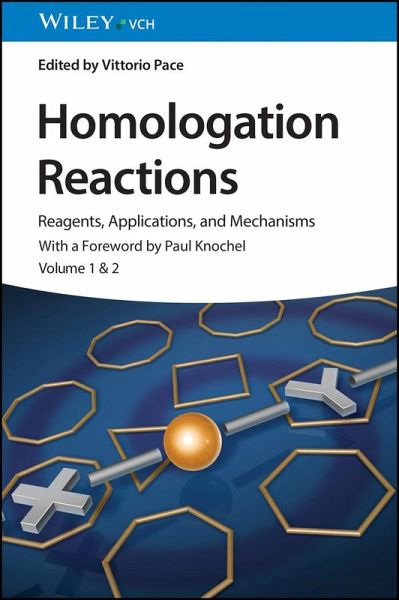
Homologation Reactions (eBook, PDF)
Reagents, Applications, and Mechanisms, 2 Volume Set
Redaktion: Pace, Vittorio
Versandkostenfrei!
Sofort per Download lieferbar
Statt: 379,00 €**
340,99 €
inkl. MwSt. und vom Verlag festgesetzt.
**Preis der gedruckten Ausgabe (Gebundenes Buch)
Alle Infos zum eBook verschenkenWeitere Ausgaben:

PAYBACK Punkte
0 °P sammeln!
Provides a unique summary of homologation strategies in organic synthesisHomologation Reactions presents different concepts underpinning the use of homologating reagents as well as their applications in organic synthesis. It covers in-depth discussions on the rationales governing this kind of transformations with a strong emphasis on mechanistic elements modulating critical aspects (e.g. selectivity) of the processes. In addition, this two-volume work features: Metal carbenoids, ylides, and diazo reagents Homologating agents working under nucleophilic, electrophilic, and radical regime Homolo...
Provides a unique summary of homologation strategies in organic synthesis
Homologation Reactions presents different concepts underpinning the use of homologating reagents as well as their applications in organic synthesis. It covers in-depth discussions on the rationales governing this kind of transformations with a strong emphasis on mechanistic elements modulating critical aspects (e.g. selectivity) of the processes. In addition, this two-volume work features:
Written by an international team of leaders in the field, the book is a useful guide for designing effective transformations by using homologation reactions. It is a must-read for every synthetic chemist in academia and industry!
Homologation Reactions presents different concepts underpinning the use of homologating reagents as well as their applications in organic synthesis. It covers in-depth discussions on the rationales governing this kind of transformations with a strong emphasis on mechanistic elements modulating critical aspects (e.g. selectivity) of the processes. In addition, this two-volume work features:
- Metal carbenoids, ylides, and diazo reagents
- Homologating agents working under nucleophilic, electrophilic, and radical regime
- Homologations realized on boron-containing or carbon-centered linchpins
- Use of highly sensitive fluorinated homologating agents
- Progressive homologations and the concept of assembly line synthesis
- Homologation processes followed by rearrangement cascades
- Construction of cyclic motifs and ring-expansion
- Homologation reactions with carbon monoxide and carbon dioxide
- New and/or challenging directions to expect in the future
Written by an international team of leaders in the field, the book is a useful guide for designing effective transformations by using homologation reactions. It is a must-read for every synthetic chemist in academia and industry!
Dieser Download kann aus rechtlichen Gründen nur mit Rechnungsadresse in D ausgeliefert werden.













